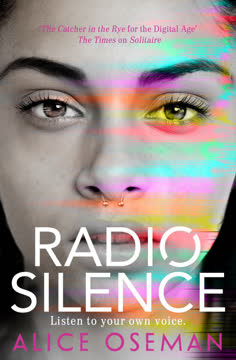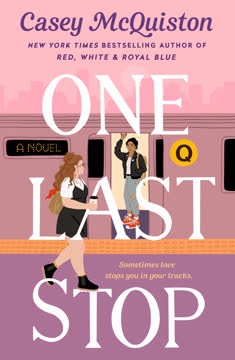Plot Summary
Alone in Winter Dorm
Marin, a college freshman, remains alone in her New York dorm over winter break, haunted by the recent death of her grandfather, Gramps. The campus is empty, the silence oppressive, and Marin's only company is her anxiety and the memories she tries to suppress. She struggles to fill her days with routines—reading, making lists, and meditating—while the absence of family and friends deepens her sense of isolation. The cold, unfamiliar landscape mirrors her internal state: numb, adrift, and uncertain. Marin's only anticipated interruption is the impending visit from her former best friend, Mabel, which she both dreads and hopes will offer some relief from her loneliness and guilt.
Mabel's Arrival, Unspoken Tension
Mabel arrives, bringing warmth and reminders of Marin's past life in California. Their reunion is fraught with unspoken pain and unresolved questions. Mabel's presence is both comforting and unsettling, as the two navigate the changed landscape of their friendship. They tiptoe around the reasons for Marin's silence and withdrawal, sharing small talk about classes and dorm life, but the weight of what's unsaid lingers. Mabel's attempts to reconnect are met with Marin's guardedness, and both are acutely aware of the emotional chasm that has opened between them since Gramps's death and Marin's abrupt departure.
Ghosts, Memories, and Loss
Marin's memories of her life with Gramps and her mother's absence surface in vivid, sometimes painful detail. She recalls the rhythms of their home, the comfort of shared routines, and the subtle ways grief shaped their lives. Ghosts—both literal and metaphorical—populate her thoughts, as she reflects on literature, family, and the stories she's told herself to survive. The loss of her mother and the enigmatic silence of Gramps about the past become central to Marin's identity, fueling her longing for connection and understanding, even as she pushes others away.
Gifts, Motives, and Invitations
Mabel reveals her true motive for visiting: she wants Marin to come home with her for Christmas, to be part of her family again. She offers Marin a place of belonging, a room of her own, and the unconditional love of her parents, Ana and Javier. Marin, however, cannot accept. The thought of returning to San Francisco, to the site of her trauma and loss, is unbearable. The conversation is tender but fraught, as Mabel tries to persuade Marin to say yes, and Marin, paralyzed by fear and shame, can only refuse, deepening the ache between them.
Hauntings and Hidden Truths
Marin and Mabel's days together are filled with attempts at normalcy—shopping, eating, reminiscing—but the specter of what happened at the end of summer looms. Marin's avoidance of the truth, her inability to grieve openly, and her refusal to return home all point to deeper wounds. Mabel's patience is tested, and their conversations circle around the pain without ever fully confronting it. Marin's internal monologue is a swirl of guilt, longing, and the terror of being truly seen, as she clings to the fragile safety of her new, self-imposed exile.
Out in the Snowstorm
A snowstorm traps Marin and Mabel indoors, forcing them into closer proximity. They venture out for breakfast, buy gifts, and share small moments of happiness—a pottery shop, a café, a bell for Mabel. The storm becomes a metaphor for their emotional state: cold, isolating, but also an opportunity for warmth and shelter. Marin secures a job at the pottery studio, a small step toward building a new life. The enforced togetherness brings moments of laughter and nostalgia, but also underscores the distance that remains between them.
Summer's Love and Denial
Flashbacks to the previous summer reveal the depth of Marin and Mabel's relationship. Their friendship blossomed into love, culminating in a night on the beach where they crossed the threshold from friends to lovers. The summer is painted as a time of denial—of Gramps's declining health, of the looming separations, of the fragility of happiness. Marin clings to the illusion that everything will remain as it was, even as the evidence of change mounts. The sweetness of first love is shadowed by the knowledge that it cannot last.
Power Outage, Shelter, and Cards
A campus-wide power outage forces Marin and Mabel to seek shelter with Tommy, the groundskeeper. In his warm, cluttered cottage, they share a meal, play cards, and find a measure of comfort in each other's company. The darkness and cold outside contrast with the intimacy and safety inside, allowing them to lower their defenses. Sleeping side by side, they are reminded of the closeness they once shared, and the night becomes a turning point—a space where grief, regret, and love can coexist, if only temporarily.
Night on the Beach
Marin recalls the night she and Mabel first made love on the beach, a moment of vulnerability and joy that marked the height of their connection. The memory is bittersweet, colored by the knowledge of what would follow: separation, silence, and Marin's retreat into herself. The innocence of that night stands in stark contrast to the pain that would come, and Marin mourns not just the loss of Gramps, but the loss of that simpler, more hopeful version of herself and her relationship with Mabel.
Letters, Lies, and Grief
Marin's investigation into Gramps's past uncovers a web of lies: the letters from "Birdie," the supposed love of his life, were all written by Gramps himself. The closet behind his room is a shrine to Marin's mother, filled with her belongings and photographs Marin never saw. The revelation shatters Marin's understanding of her family, leaving her feeling betrayed and unmoored. Gramps's mental illness, his inability to share the truth, and his ultimate disappearance into the ocean become the central trauma Marin must confront.
The Secret Room Revealed
The night Gramps disappears, Marin discovers the secret room and the extent of his deception. The police are called, Ana and Javier wait for her, but Marin flees, unable to face the truth or accept comfort. She leaves San Francisco with nothing but her phone, wallet, and a photograph of her mother, severing ties with her past. The experience is both a breaking and a beginning, as Marin is forced to reckon with the reality of her family's history and her own capacity for survival.
Motel Exile and Escape
Marin's first weeks in New York are spent in a seedy motel, surrounded by strangers and haunted by grief. She moves through her days in a fog, eating at diners, avoiding contact, and waiting for the dorms to open. The motel becomes a liminal space—a place of exile and self-erasure—where Marin tries to disappear from her own pain. The experience leaves her raw and wary, but also marks the start of her slow, painful journey back to herself.
Telling Mabel Everything
Back in the present, Marin finally tells Mabel the full story of what happened: Gramps's lies, his disappearance, her own flight. The confession is cathartic, breaking the silence that has kept them apart. Mabel listens, offers comfort, and asks Marin to come home with her one last time. Marin still cannot say yes, but the act of sharing her truth allows for a measure of understanding and forgiveness between them. The possibility of healing, though distant, begins to emerge.
Refusing, Remembering, Reaching Out
Mabel departs, leaving Marin alone once more. Marin is wracked with regret and longing, but also begins to reach out—to Jones, to Hannah, to the world she has shut out. She starts to reclaim small pieces of her life: decorating her room, caring for her plant, making soup. The process is slow and uncertain, but each act is a step toward rejoining the living. Marin's memories of her mother and Gramps remain painful, but she begins to see them as part of her, not just sources of loss.
Christmas Eve, Found Family
On Christmas Eve, Mabel, Ana, and Javier return, surprising Marin with their presence and love. They cook, decorate, and celebrate together, transforming the empty dorm into a place of warmth and joy. Ana tells Marin she wants her to be part of their family, offering the unconditional acceptance Marin has longed for. The holiday becomes a moment of grace—a chance for Marin to say yes to love, to belonging, and to the possibility of a future not defined by loss.
Saying Yes to Love
Marin accepts Ana's offer, allowing herself to be held, to remember her mother's love, and to believe in the possibility of happiness. The act of saying yes is both an ending and a beginning—a letting go of the past and an embrace of the present. Marin's grief does not disappear, but it is transformed by the love and support of those around her. She begins to imagine a life where she is not alone, where she can be both wounded and whole.
Beginning Again, Alone and Together
As winter break ends, Marin remains in the dorm, but she is no longer the same girl who arrived in September. She has faced her ghosts, told her story, and allowed herself to be loved. The future is uncertain, but Marin is learning to live with ambiguity, to find beauty in small things, and to trust that she will be okay. The story closes with Marin looking out at the snow, waiting for a message from Mabel, and feeling, for the first time in a long while, that she is not alone.
Characters
Marin Delaney
Marin is the novel's protagonist, a college freshman who has fled her California home after the sudden death and mysterious disappearance of her grandfather. Raised by Gramps after her mother's death, Marin's identity is shaped by loss, secrecy, and a longing for connection. She is introspective, intelligent, and emotionally guarded, struggling to process her grief and the betrayal she feels upon discovering Gramps's lies. Marin's relationships—with Mabel, with her chosen family, and with herself—are marked by both tenderness and distance. Over the course of the story, she moves from numb isolation to tentative openness, learning to accept love and to begin healing.
Mabel Valenzuela
Mabel is Marin's best friend and first love, whose visit during winter break catalyzes Marin's journey toward healing. Warm, empathetic, and determined, Mabel refuses to give up on Marin, even after months of silence. Her own life has moved forward—she has a new boyfriend, Jacob—but her bond with Marin remains deep and complicated. Mabel's family, Ana and Javier, offer Marin the home and acceptance she craves. Mabel's presence forces Marin to confront her pain, and her unwavering support is both a comfort and a challenge, pushing Marin to face the truth and to risk connection again.
Gramps (Marin's Grandfather)
Gramps is Marin's sole guardian after her mother's death, a figure of warmth, humor, and routine. Beneath his affection lies a profound loneliness and mental illness, manifesting in the elaborate fiction of "Birdie" and the secret shrine to Marin's mother. Gramps's inability to share his grief or the truth with Marin ultimately leads to his disappearance and presumed suicide. His legacy is both a source of comfort and pain for Marin, who must reconcile the love he gave with the lies he told. Gramps embodies the complexities of family, memory, and the ways we try to protect those we love.
Ana Valenzuela
Ana is Mabel's mother and a celebrated artist, whose home is a haven of warmth, creativity, and acceptance. She offers Marin the unconditional love and stability she has lost, eventually inviting her to become part of their family. Ana's presence is grounding and healing, providing a model of motherhood that contrasts with Marin's own experience. Her empathy and insight help Marin begin to trust again, and her embrace at the novel's end is a pivotal moment of transformation for Marin.
Javier Valenzuela
Javier, Mabel's father, is a steady, loving presence in both Mabel's and Marin's lives. He is practical, humorous, and deeply caring, welcoming Marin into the family without reservation. Javier's warmth and generosity help counterbalance Marin's sense of abandonment, and his partnership with Ana models a healthy, supportive relationship. He is instrumental in the family's decision to travel to New York for Christmas, embodying the idea of chosen family and the power of community.
Hannah
Hannah is Marin's college roommate, a practical, kind, and straightforward young woman from Manhattan. She provides Marin with stability and friendship during her first semester, offering small but significant acts of care—sharing music, reading aloud, and including Marin in her social circle. Hannah's presence helps Marin navigate the unfamiliar world of college and serves as a reminder that new connections are possible, even in the midst of grief.
Tommy (Groundskeeper)
Tommy is the college groundskeeper who remains on campus during winter break. When a snowstorm and power outage leave Marin and Mabel stranded, he offers them warmth and safety in his cottage. Tommy's quiet generosity and practical kindness create a space for Marin and Mabel to reconnect, and his home becomes a temporary refuge from the cold—both literal and emotional—of Marin's isolation.
Jones
Jones is one of Gramps's longtime friends, a member of his poker group, and a surrogate grandfather figure to Marin. After Gramps's disappearance, Jones and his friends rescue Marin's belongings from being lost in an estate sale, preserving the tangible remnants of her childhood. Jones's phone call with Marin is a moment of reconnection, offering her a thread back to her old life and a measure of closure.
Birdie (Claire Delaney)
Birdie is Marin's mother, who died when Marin was a toddler. Her presence in the novel is spectral—she exists in memories, photographs, and the letters Gramps wrote in her name. Birdie represents both the loss that defines Marin's life and the possibility of love that endures beyond death. The discovery of her belongings and images in Gramps's secret room is a turning point for Marin, forcing her to confront the reality of her family's history.
Jacob
Jacob is Mabel's new boyfriend in Los Angeles, a kind and understanding presence who accepts Mabel's complicated history with Marin. His existence is a reminder that life continues, that love can take new forms, and that Marin and Mabel's relationship, while changed, still matters. Jacob's role is peripheral but significant, marking the transition from past to future for both girls.
Plot Devices
Nonlinear Narrative and Flashbacks
The novel employs a nonlinear structure, moving fluidly between Marin's present in the empty dorm and her memories of the previous summer, her life with Gramps, and her relationship with Mabel. Flashbacks are used to gradually unveil the central mysteries—Gramps's mental illness, the truth about Birdie, and the events that led Marin to flee California. This structure mirrors Marin's psychological state, where past and present are inextricably linked, and healing requires confronting what has been repressed.
Epistolary Elements and Symbolic Objects
Letters—real and forged—are central to the plot, serving as both evidence of love and instruments of deception. Objects like the yellow bowls, the photograph of Marin's mother, and the bell for Mabel function as symbols of memory, connection, and hope. These tangible items ground the characters in their histories and relationships, providing comfort and continuity amid upheaval.
Foreshadowing and Motifs
The novel is rich with motifs—ghosts, water, snow, and art—that foreshadow revelations and underscore themes of loss, transformation, and resilience. The recurring references to literature (Jane Eyre, The Turn of the Screw, One Hundred Years of Solitude) and art (The Two Fridas) serve as mirrors for Marin's internal journey, offering frameworks for understanding grief, identity, and the possibility of healing.
Silence and Communication
The tension between silence and speech is a driving force in the novel. Marin's refusal to answer Mabel's texts, her inability to talk about Gramps, and the secrets kept by her family all create barriers to intimacy. The act of finally telling the truth—confessing, listening, and being heard—is depicted as both terrifying and redemptive, the necessary first step toward connection and recovery.
Analysis
Nina LaCour's We Are Okay is a luminous meditation on grief, loneliness, and the slow, painful work of healing. Through Marin's journey, the novel explores how trauma can isolate us, not just from others but from ourselves, and how the stories we inherit—and the ones we invent—shape our sense of belonging. The book's spare, poetic prose and nonlinear structure invite readers to inhabit Marin's fractured world, where memory and reality blur, and where the search for truth is both a burden and a liberation. At its heart, the novel is about the power of chosen family, the courage it takes to accept love after betrayal, and the resilience required to begin again. LaCour suggests that while loss may never fully leave us, it need not define us; through vulnerability, honesty, and the willingness to say yes—to help, to hope, to love—we can find our way back to ourselves and to each other. We Are Okay is a quiet, deeply felt reminder that even in our loneliest moments, we are never truly alone.
Last updated:
Review Summary
We Are Okay received mostly positive reviews, with readers praising its emotional depth, beautiful writing, and exploration of grief and loneliness. Many found the characters relatable and appreciated the LGBTQ+ representation. Some critics felt the plot was slow-paced or lacked action. The book's impact varied depending on readers' personal experiences, with many finding it deeply moving and cathartic. While some struggled to connect with the story, others considered it a new favorite and a powerful portrayal of healing from loss.
Similar Books
Download PDF
Download EPUB
.epub digital book format is ideal for reading ebooks on phones, tablets, and e-readers.










![6 Times We Almost Kissed [and One Time We Did] Summary](https://files.sobrief.com/social/cover_6-times-we-almost-kissed-and-one-time-we-did_360px_1747297013.jpg)




